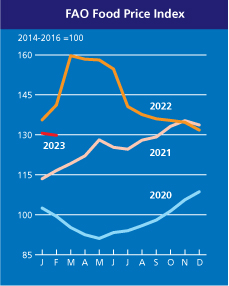The Food and Agriculture Organisation (FAO) Cereal
Price Index rose 1.7 percent in April, its fourth consecutive monthly increase,
and is now 15.4 percent above its value a year earlier, reports NaijaAgroNet.
Wheat prices NaijaAgroNet were supported by weather-related risks in the
United States, while drought-reduced production in Argentina and lower
plantings in the U.S. pushed up international maize prices. Rice prices also
rose.
The FAO Dairy Price Index rose 3.4 percent from March,
reflecting robust demand for all milk products and apprehensions about export
availabilities in New Zealand.
The FAO Food Price Index is a measure of the monthly change in
international prices of a basket of food commodities.
Declines were posted in April on the three other sub-indices.
The FAO Vegetable Oil Price Index declined by 1.4 percent since March, while
the FAO Meat Price Index fell 0.9 percent.
The FAO Sugar Price Index fell 4.8 percent in April from the
previous month, continuing a decline that began last December, and averaging 24
percent lower than April 2017. Lower prices reflected a supply glut buoyed by
record outputs in Thailand and in India, the world's second-largest sugar
producer, as well as the depreciation of the Real, the currency of Brazil, the
world's largest producer.
Isaac Oyimah/GEE
... Linking agrobiz, sustainable environs, people & technology






